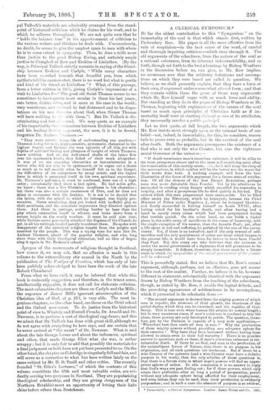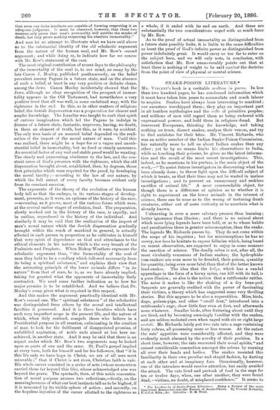A CLERICAL SYMPOSIUM.* BY far the ablest contribution to this
" Symposium " on the immortality of the soul is that which stands first, written by Prebendary Row. His paper is all the more effective from the vein of scepticism—in the best sense of the word, of careful and thorough inquiring criticism—which runs through it. The old arguments of the schoolmen, from the nature of the soul as a rational substance, from its inherent indestructibility, and BO forth, though set forth to the best advantage by Bishop Weathers in the discussion before us, can give, as Mr. Row implies, no assurance now that the arbitrary definitions and assump- tions on which they were based are called in question. We believe, as we shall presently explain, that they have a force of their own, if expressed under a somewhat altered form ; and that they contain within them the germ of those very arguments which Mr. Row himself urges with so much force and ability. But standing as they do in the pages of Bishop Weathers or St. Thomas, beginning with explanations of the nature of the soul based as much upon principles of Christian faith as if im- mortality itself were at starting claimed as one of its attributes, they necessarily involve a pet (tie principii.
Let us first quote, at full length, the two arguments which Mr. Row insists most strongly upon as the rational basis of our belief—not, indeed, in immortality, for this, he considers, reason fails to prove even as probable, but in the survival of the soul after death. Both the arguments presuppose the existence of a God who is not only the wise Creator, but also the righteous moral Governor of the universe :—
" If death terminates man's conscious existence, it will be alike to the most prosperous sinner and to the most self-sacrificing saint after the termination of this earthly scene,--i.e., both will sleep the sleep of the unconscious, in which neither will be the better nor the worse for their works done here. A striking example will form the best illustration of the force of this argument for a future state of retribu- tion. Of all the sinners of the first French Revolution, perhaps none was more detestable than FouchO. Yet by his adroitness he succeeded in evading every danger which engulfed his comrades in iniquity, and after a prosperous life he died quietly in his bed. The crimes which this man perpetrated were unutterable. Yet be filled office under the Directory, which he betrayed ; became the Chief Minister of Police under Napoleon I., whom he betrayed likewise ; and finally succeeded in forcing himself on Louis XVIII., after having voted for his brother's death, and after having had a band in nearly every crime which had been perpetrated during that terrible period. On the other hand, no one holds a higher place in the noble army of sacrificere in the cause of humanity, with the single exception of his master, than the Apostle Paul ; yet, after a life spent in toil and suffering, he perished by the axe of the execu- tioner. Yet, if there is no hereafter, and if the only reward of self- sacrifice and the only punishment of crime are those which happen in the present life, it would have been far better to have been FouchO than Paul. But this every one who believes that the universe is under the moral government of a righteous God will pronounce to be simply incredible. It follows, therefore, that there must be a future state in which the inequalities of the moral government of the present will be redressed."
This is powerfully stated. But we believe that Mr. Row's second argument, although, perhaps, not so effective, goes yet nearer to the root of the matter. Further, we believe it to be, however different in statement, substantially identical with the argument drawn by Bishop Weathers from the teaching of the schoolmen, though, as stated by Mr. Row, it avoids the logical defects, and the provoking appearance of arbitrariness in its assumptions, which it presented in its scholastic dress :—
" The second argument is derived from the mighty powers of which man is capable, the slowness of their growth, the shortness of the period during which they can be exercised, and the rapidity of their decay. This is true even when human life attains its normal length ; but in very numerous oases, if man's existence is confined to this life alone, these powers are only developed to perish. The question, there- fore, put by the Psalmist is capable of a very wide application,— ' Wherefore haat thou made all men in vain ?' Why the production of these mighty powers without providing any adequate sphere for their exercise ? Why have they been bestowed without having been allowed to attain even to their full maturity There is no possible answer to questions such as these, if man's conscious existence is ter- minated at death. If there be no God, and man is the production of the unintelligent forces of Nature, then there is no purpose in his origination, and all such questions are irrelevant. But if there be a wise Creator of the universe (and a wise Creator must have a definite purpose in his work), then the only solution of these questions is, that there is a future state in which man's powers will find an appro- priate sphere of action. To this conclusion it is no answer to reply that God's ways are past finding out ; for if these powers, which only attain their perfection after so long a period of preparation, perish without any adequate sphere being afforded for their employment, and even before they can be used, then their production is evidently purposeless ; and in each a case the absence of purpose is so evident, * Immortality : a Clerical Symporium. London : James Nisbet and CO. 1885.
that even our finite intellects are capable of forming respecting it an adequate judgment. It must be observed, however, that these two reasons only prove that man's personality will survive the stroke of death, but they prove nothing respecting his absolute immortality."
And now let us attempt to illustrate what we have said above as to the substantial identity of the old scholastic argument from the nature of the human soul, and Mr. Row's second argument ; and while doing so, to indicate how far we concur with Mr. Row's statement of the case.
The most original contribution of recent days to the philosophy of the immortality of the soul is, to our mind, an essay by the late Canon J. Mozley, published posthumously, on the belief prevalent among Pagans in a future state, and on the absence -of such a belief, at least in any very positive or definite shape, among the Jews. Canon Mozley incidentally showed that the Jews, although no clear recognition of the prospect of immor- tality appears in the Old Testament, had nevertheless a very positive trust that all was well, in some undefined way, with the righteous in the end. In this, as in other matters of religious belief, the Jewish dispensation was a preparation for clearer and ampler knowledge. The Israelite was taught to curb that spirit of curious imagination which led the Pagans to indulge in dreams of a future state, fantastic, unproven, having, no doubt, in them an element of truth, but this, as it were, by accident. The only true basis of an assured belief depended on the reali- sation of the import of the moral nature of man. Until this was realised, there might be a hope for or a vague and unsub- stantial belief in immortality, but no fixed or steady assurance. An essential factor of any real and stable proof would be wanting. The steady and persevering obedience to the law, and the con- stant sense of God's presence with the righteous, which the old dispensation brought about, established, then, by degrees, those first principles which were required for the proof, by developing the moral faculty ;—according to the law of our nature, by which the full extent of every faculty becomes evident only from its constant exercise.
The exponents of the theory of the evolution of the human body tell us that the embryo, in its various stages of develop- ment, presents, as it were, an epitome of the history of the race, —assuming, as it grows, most of the various forms which were, at the several earlier stages of evolution, final. The preparation, slowly worked out in the history of the race, is iapidly, and in outline, reproduced in the history of the individual. And similarly it may be said that the realisation of the import of man's moral nature which the Jewish dispensation gradually brought within the reach of mankind in general, is actually effected in each person in proportion as he cultivates in himself -that very spirit of dependence on God and attendance to the ethical elements in his nature which is the very breath of the Psalmists and Prophets. When Bishop Weathers expresses the scholastic argument thus, "the Immortality of the soul of man they held to be a corollary which followed necessarily from its being a spiritual substance," and explains their view that the animating principle of the lower animals differs "in its nature" from that of man, he is, as we have already implied, taking for granted what the opponents of immortality flatly contradict. We need some further indication as to how his major premiss is to be established. And we believe that Dr. Mozley's essay gives what is required in this respect.
And this makes the argument practically identical with Mr. Row's second one. The "spiritual substance" of the scholastics was distinguished from others by the moral and intellectual faculties it possessed. And it is these faculties which have such very imperfect scope in the present life, and the nature of which, when duly realised, compels those who believe in a Providential purpose in all creation, culminating in the creation of man, to look for the fulfilment of disappointed promise, of unfulfilled aspiration, of noble ends aimed at but here un- achieved, in another state. And it may be said that there is an a.spect under which Mr. Row's two arguments may he looked upon as parts of one and the same. St. Paul's gospel implied at every turn, both for himself and for his followers, that "if in this life only we have hope in Christ, we are of all men most miserable ;" that if Christ is not risen, Christian faith is vain. His whole career consisted in a series of acts (whose momentum carried them far beyond this life), whose acknowledged aim was beyond the grave. The spectacle, then, of this noble concentra- tion of moral purpose arouses two reflections,—firstly, on the meaninglessness of what our best instincts tell us to be highest, if it is measured by its visible sphere of action ; and secondly, on the hopeless injustice of the career allotted to the righteous as a whole, if it ended with its end on earth. And these are substantially the two considerations urged with so much force by Mr. Row.
As to the proof of actual immortality as distinguished from a future state possibly finite, it is liable to the same difficulties as beset the proof of God's infinite power as distinguished from power indefinitely great. It would carry us too far to enter on the subject here, and we will only note, in conclusion, with satisfaction that Mr. Row unanswerably points out that at least there is nothing of weight to be said against the doctrine from the point of view of physical or mental science.



































 Previous page
Previous page